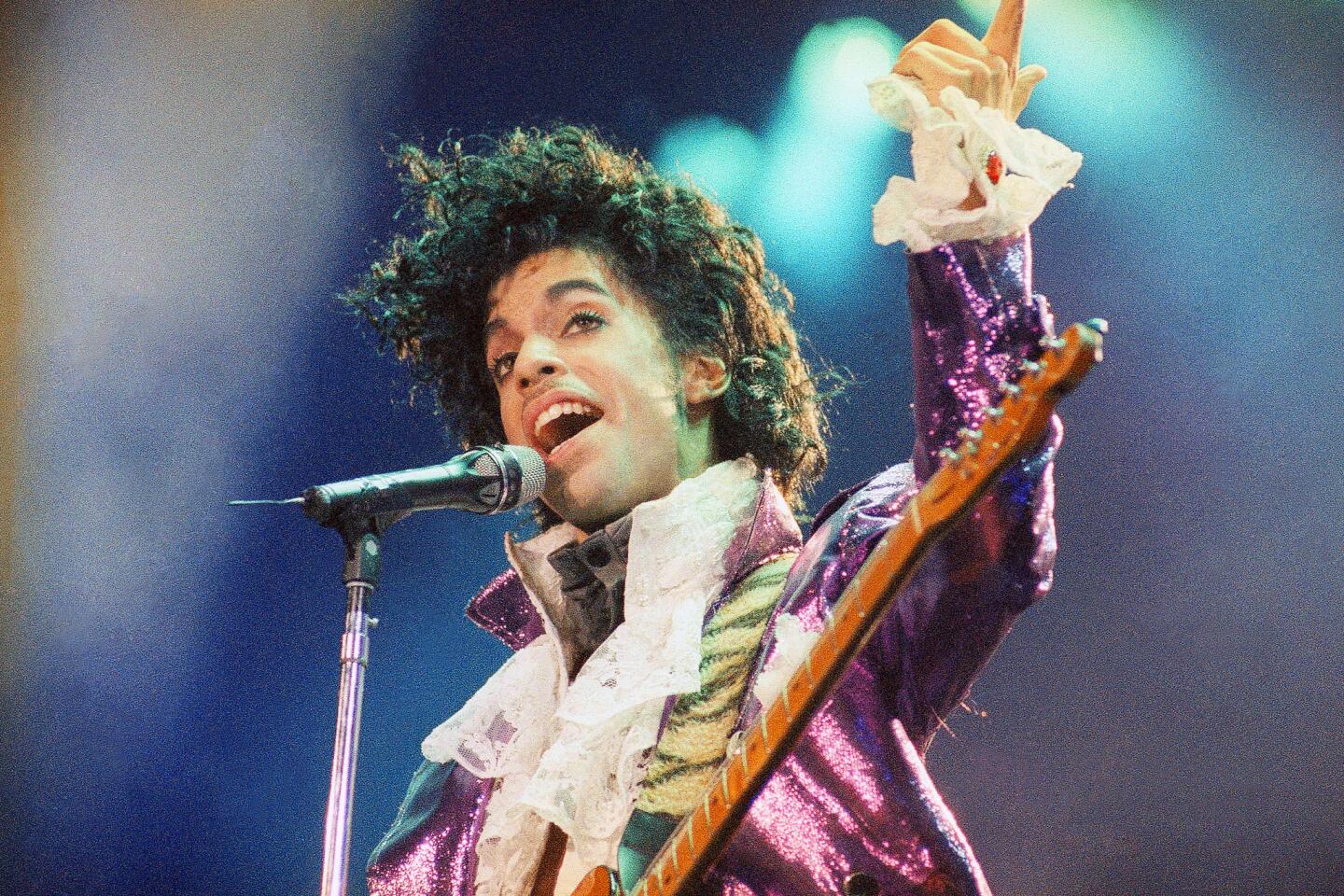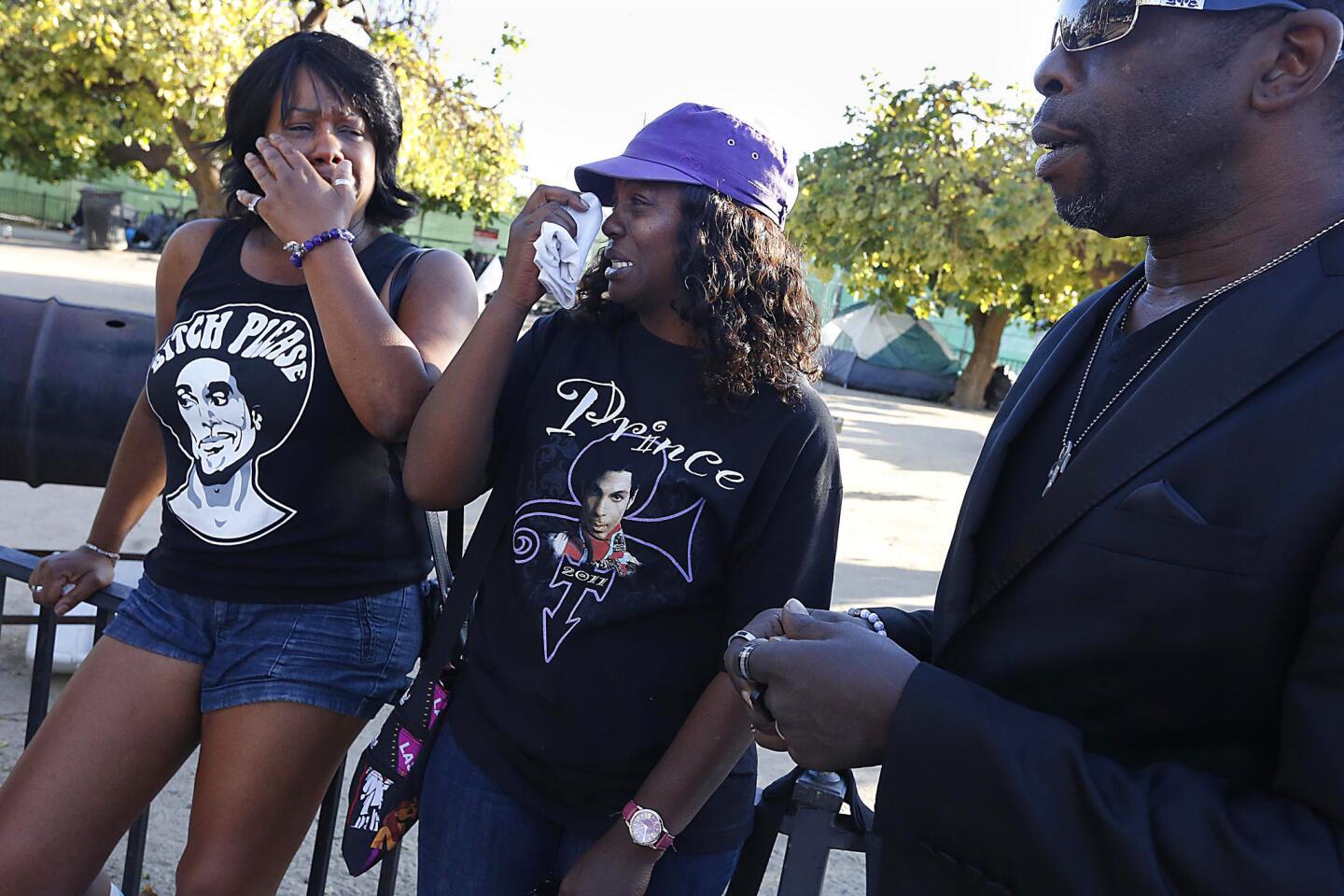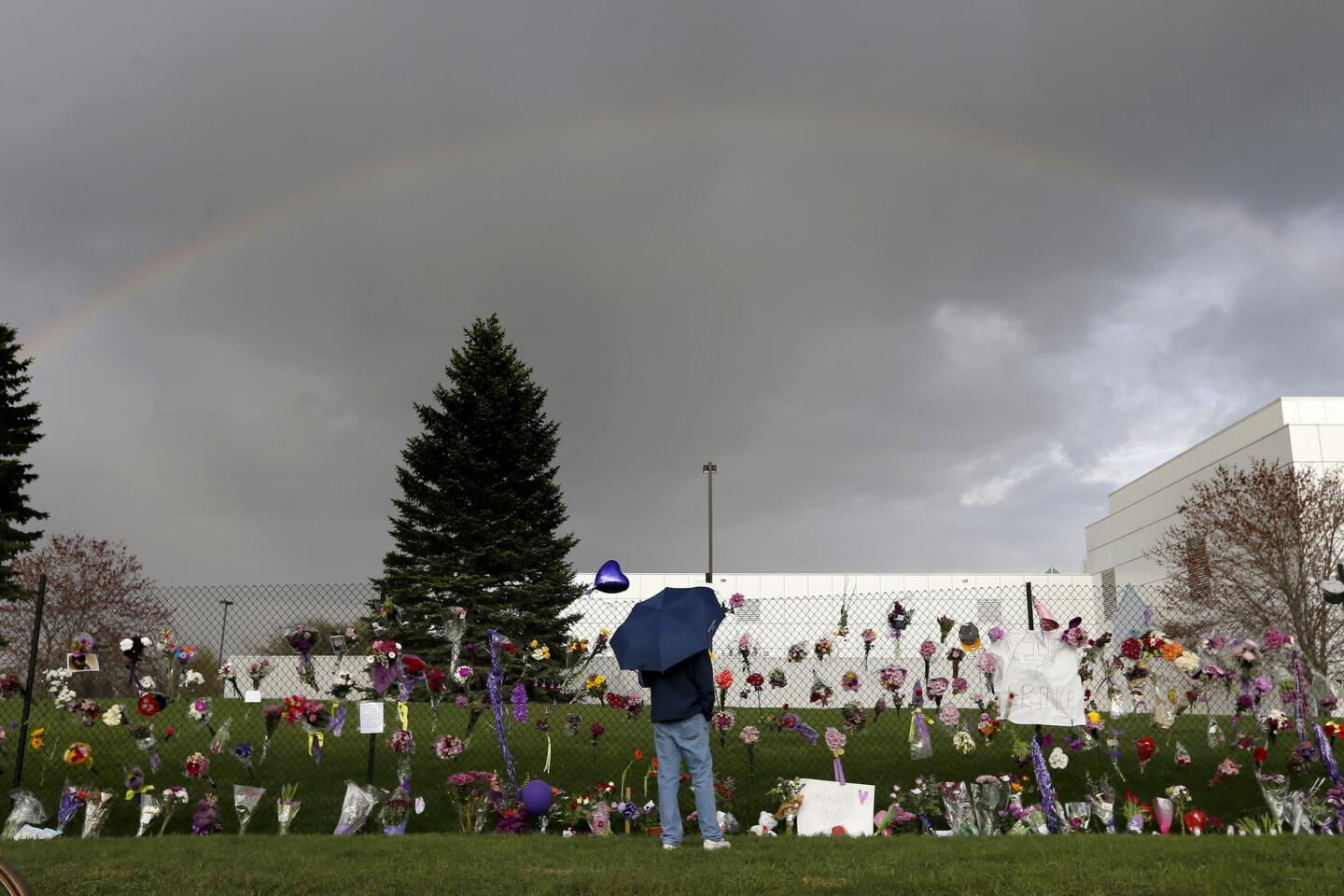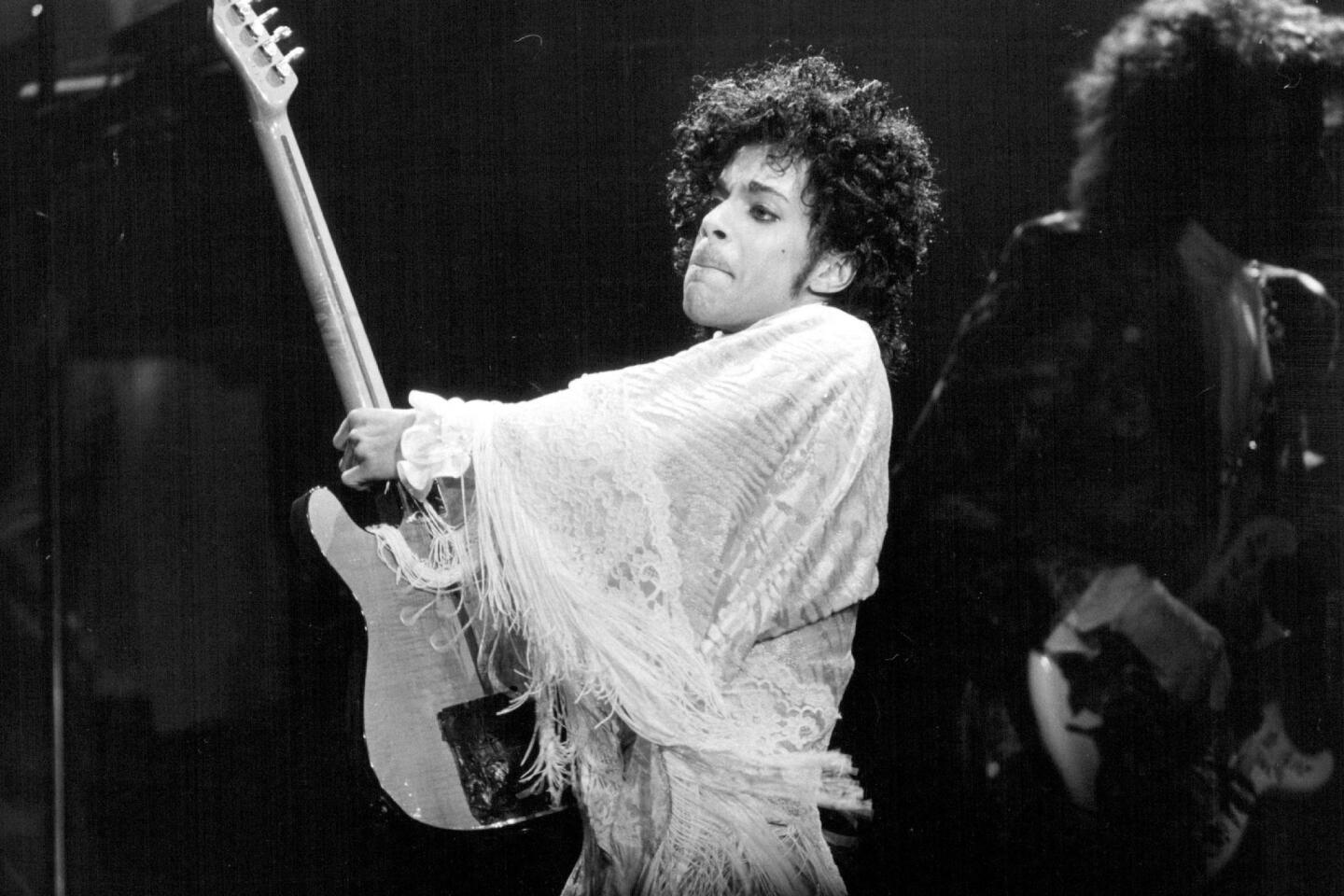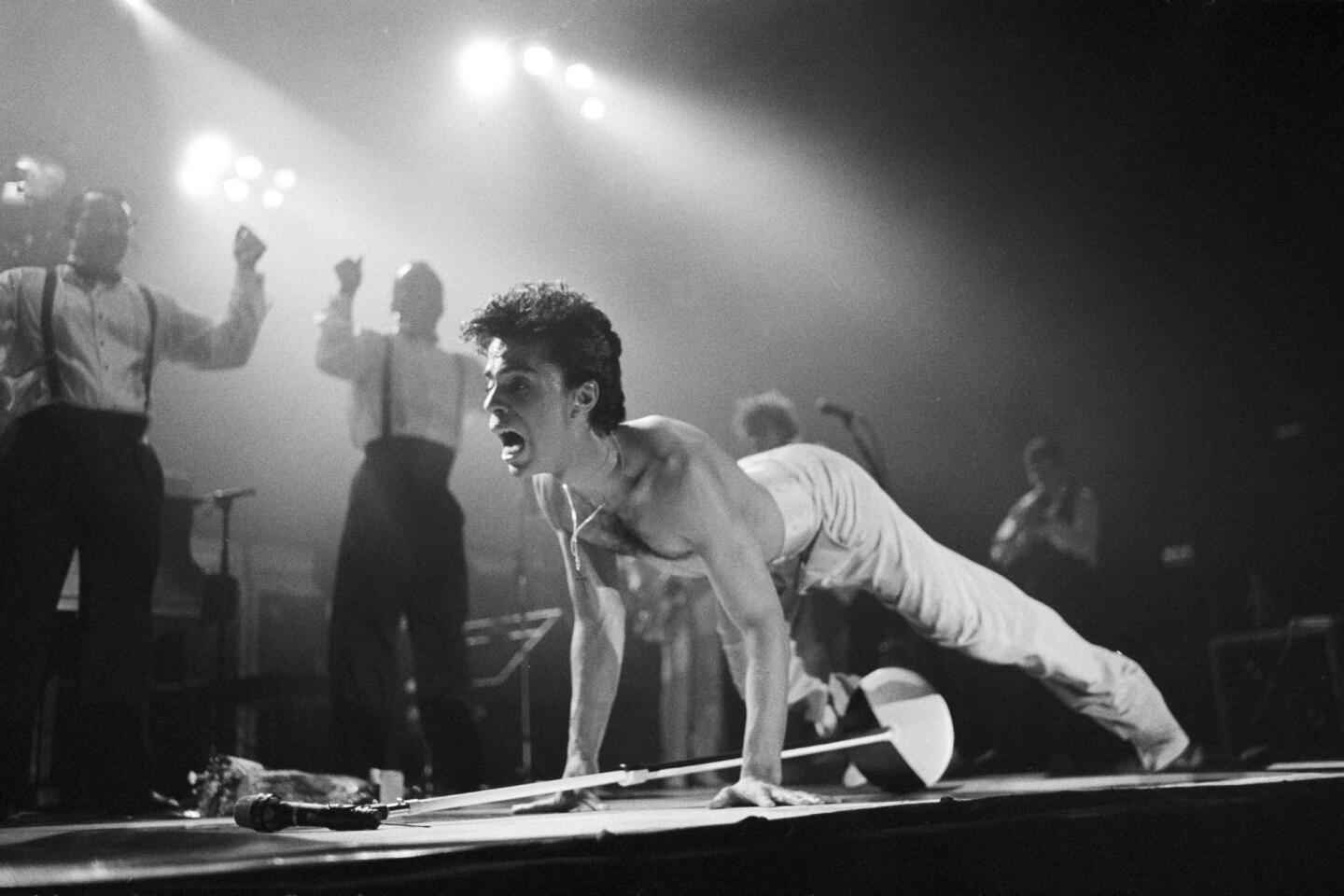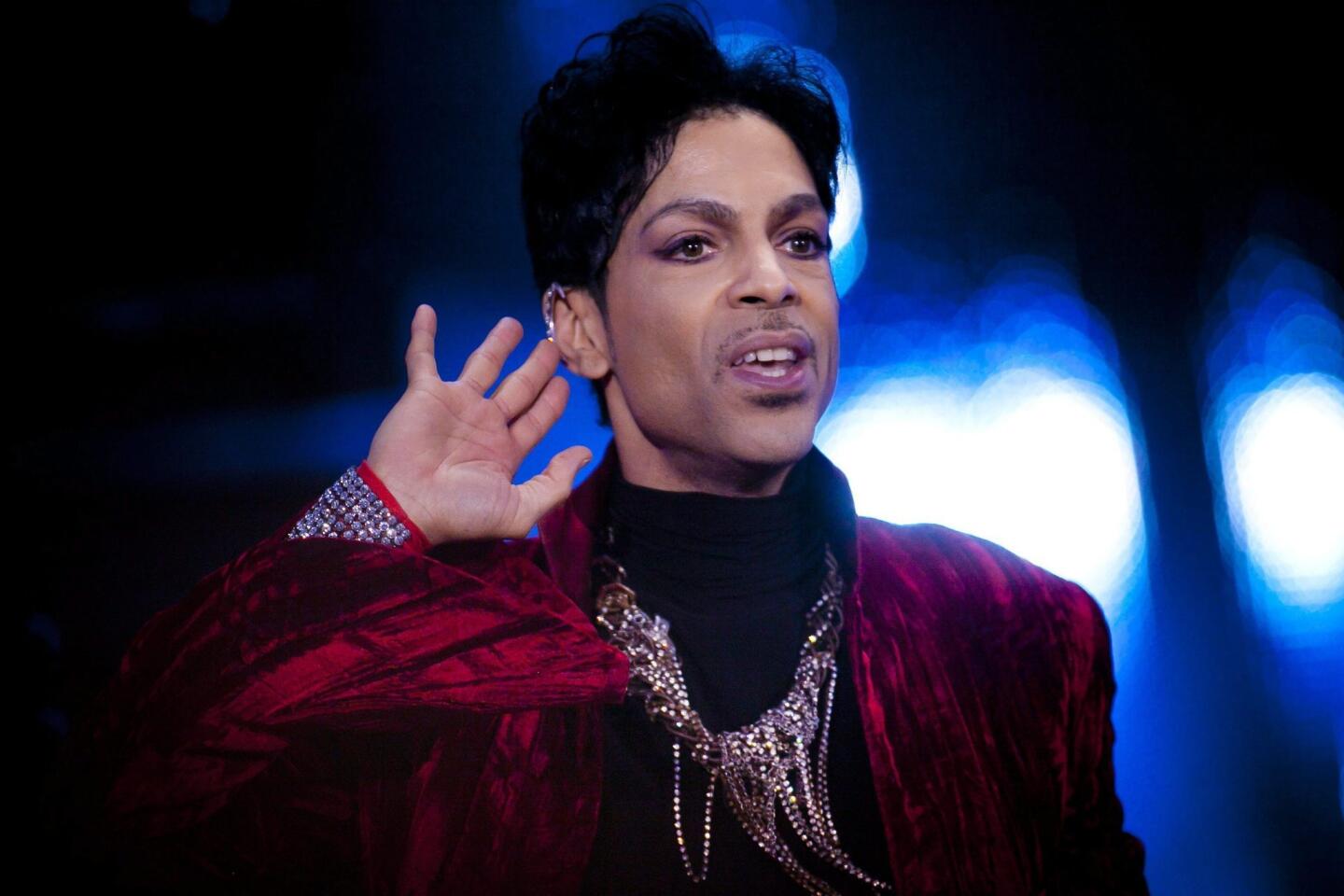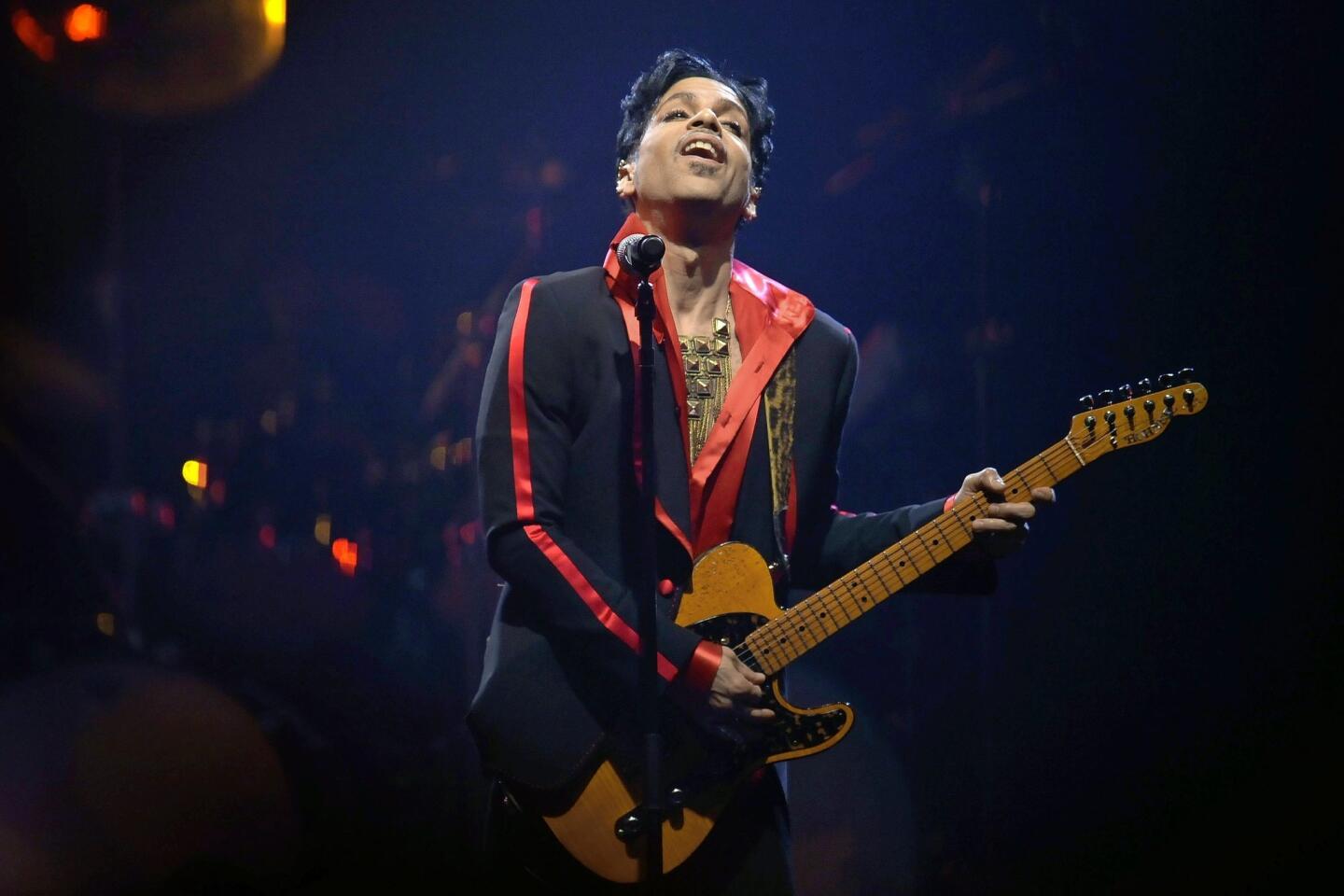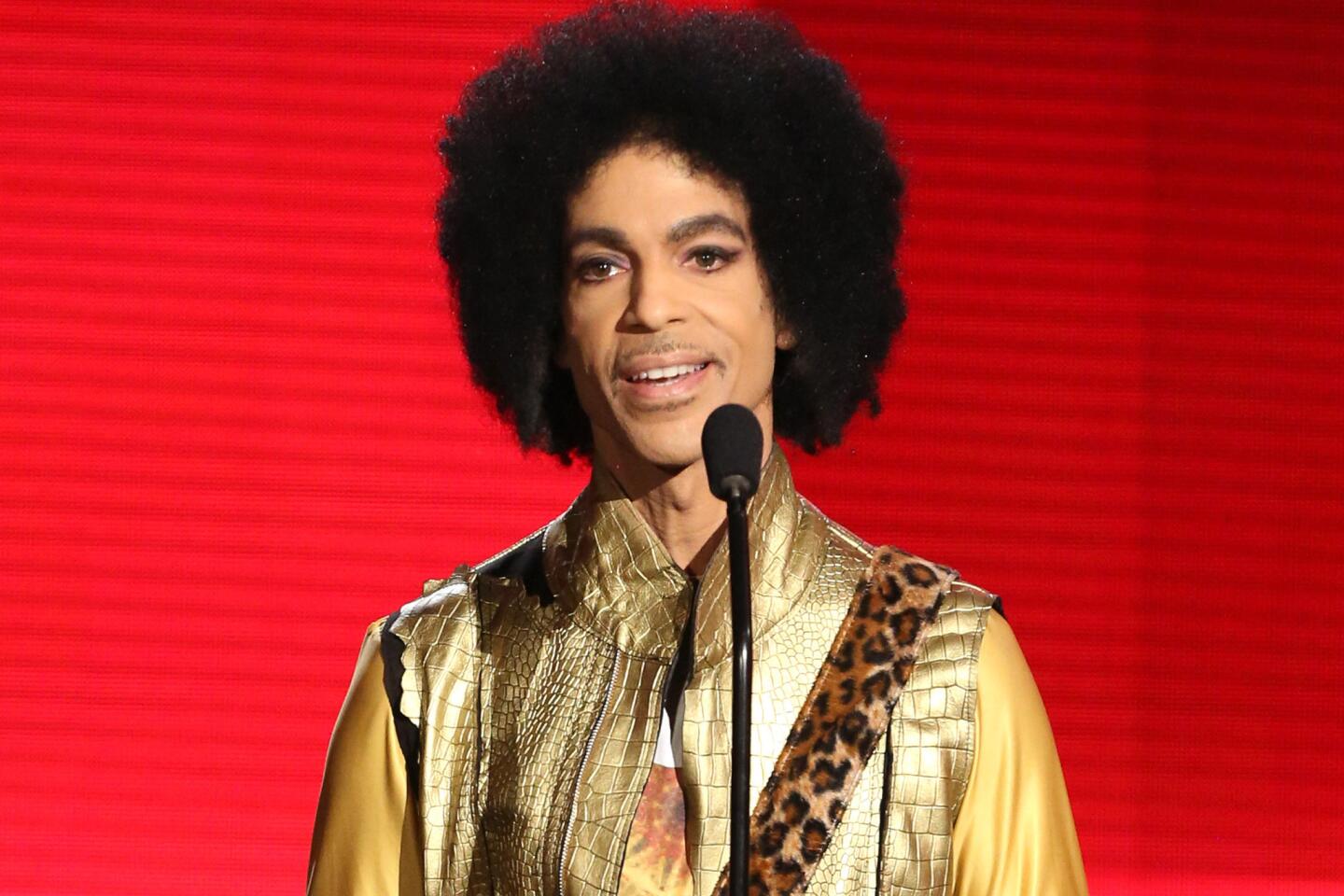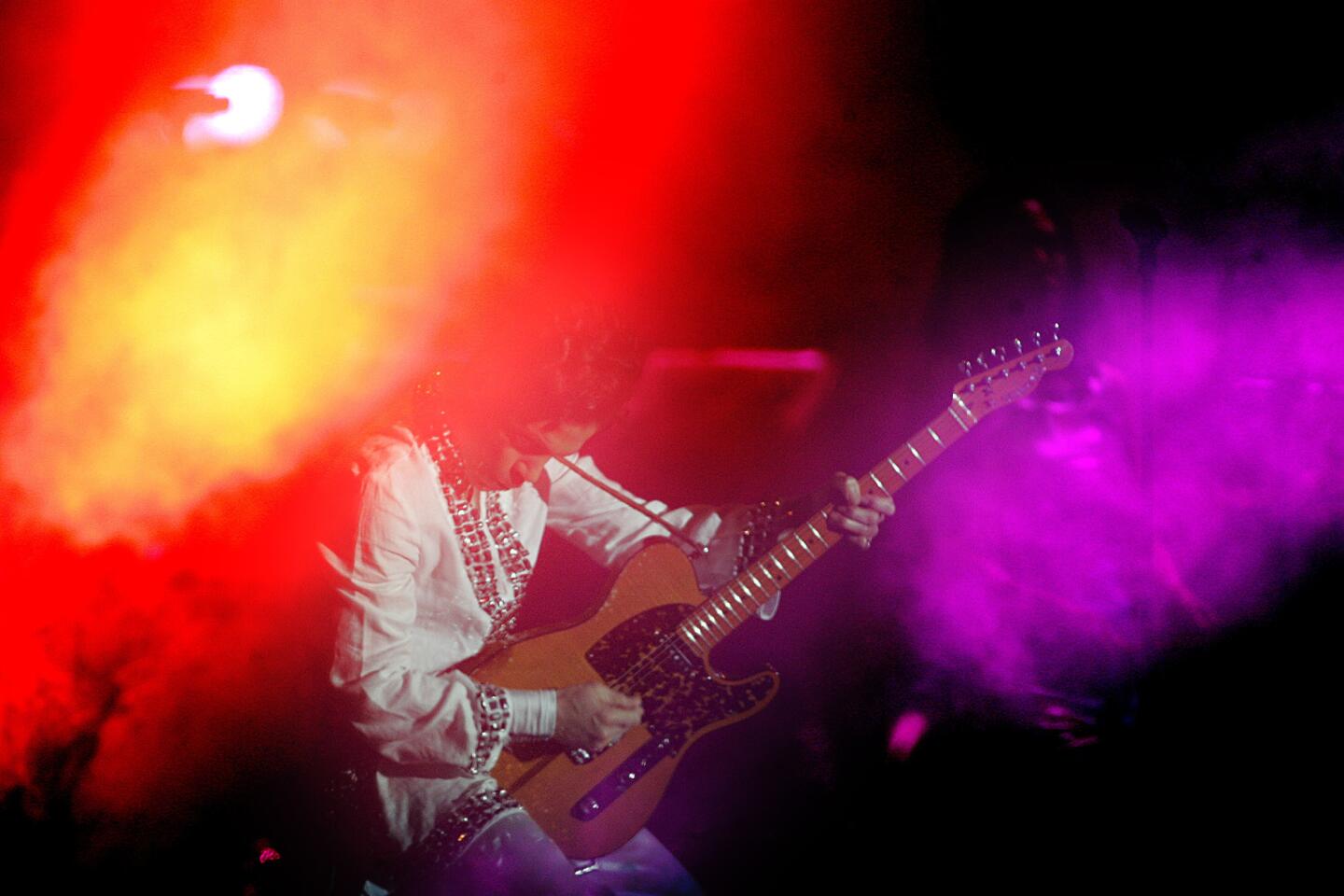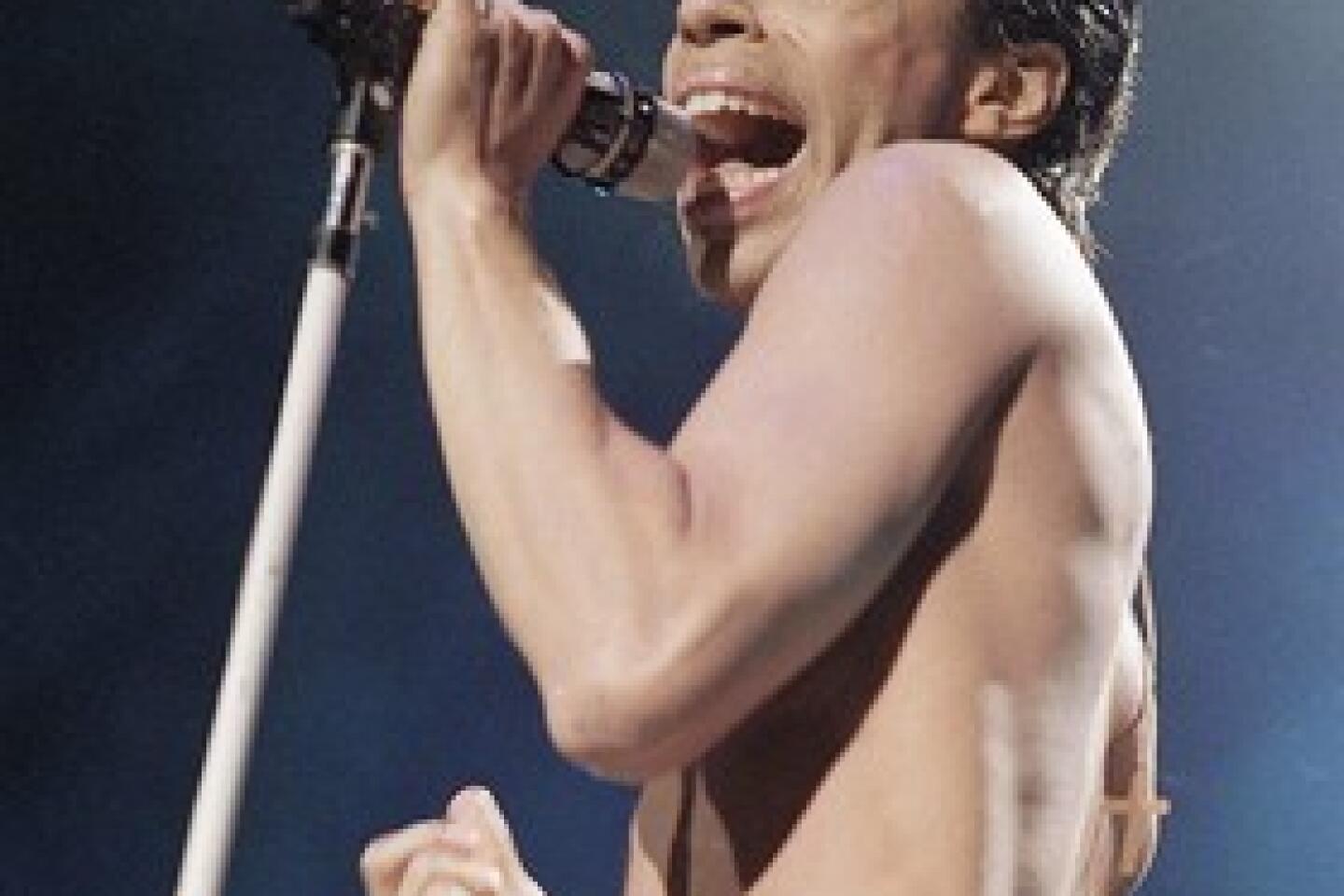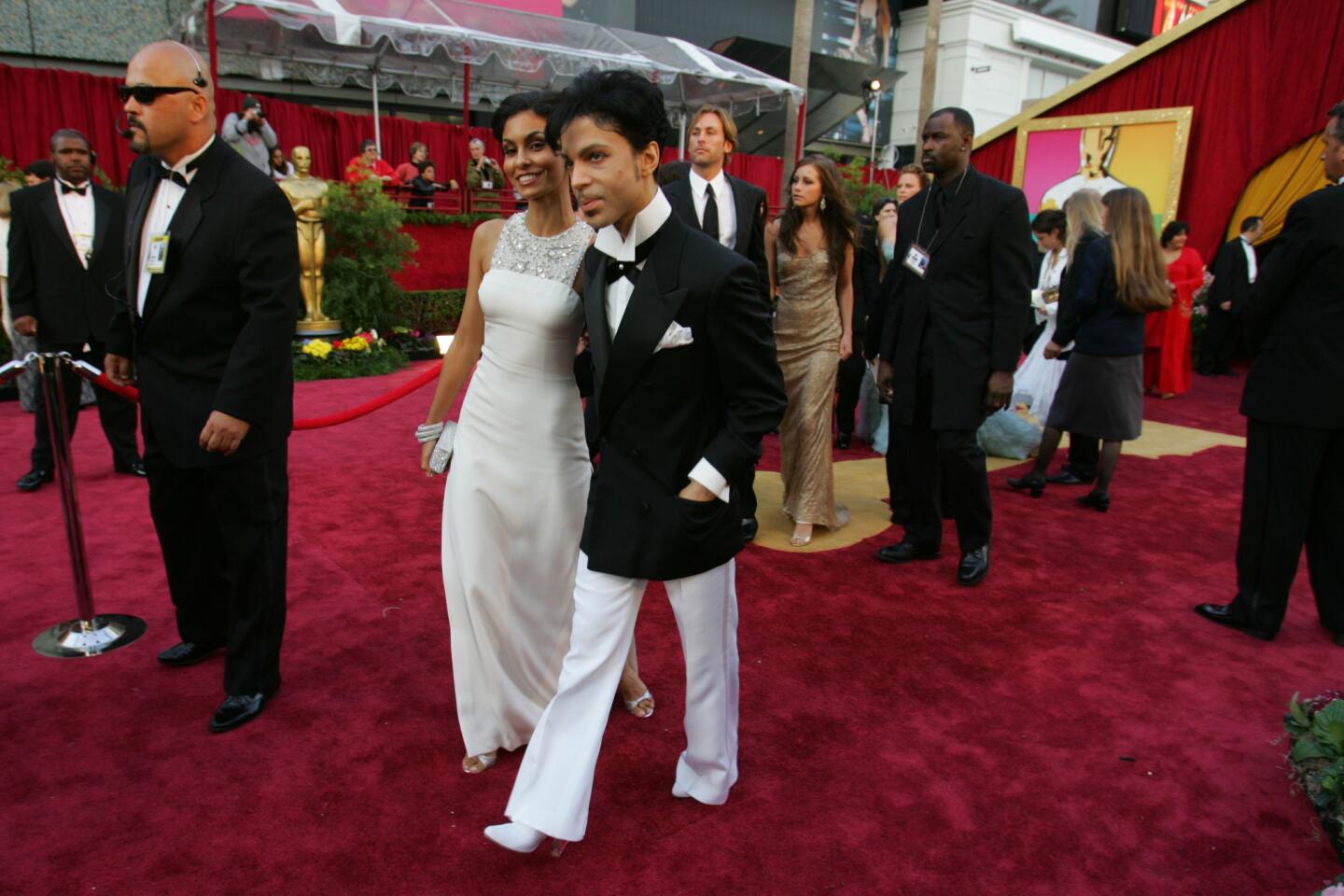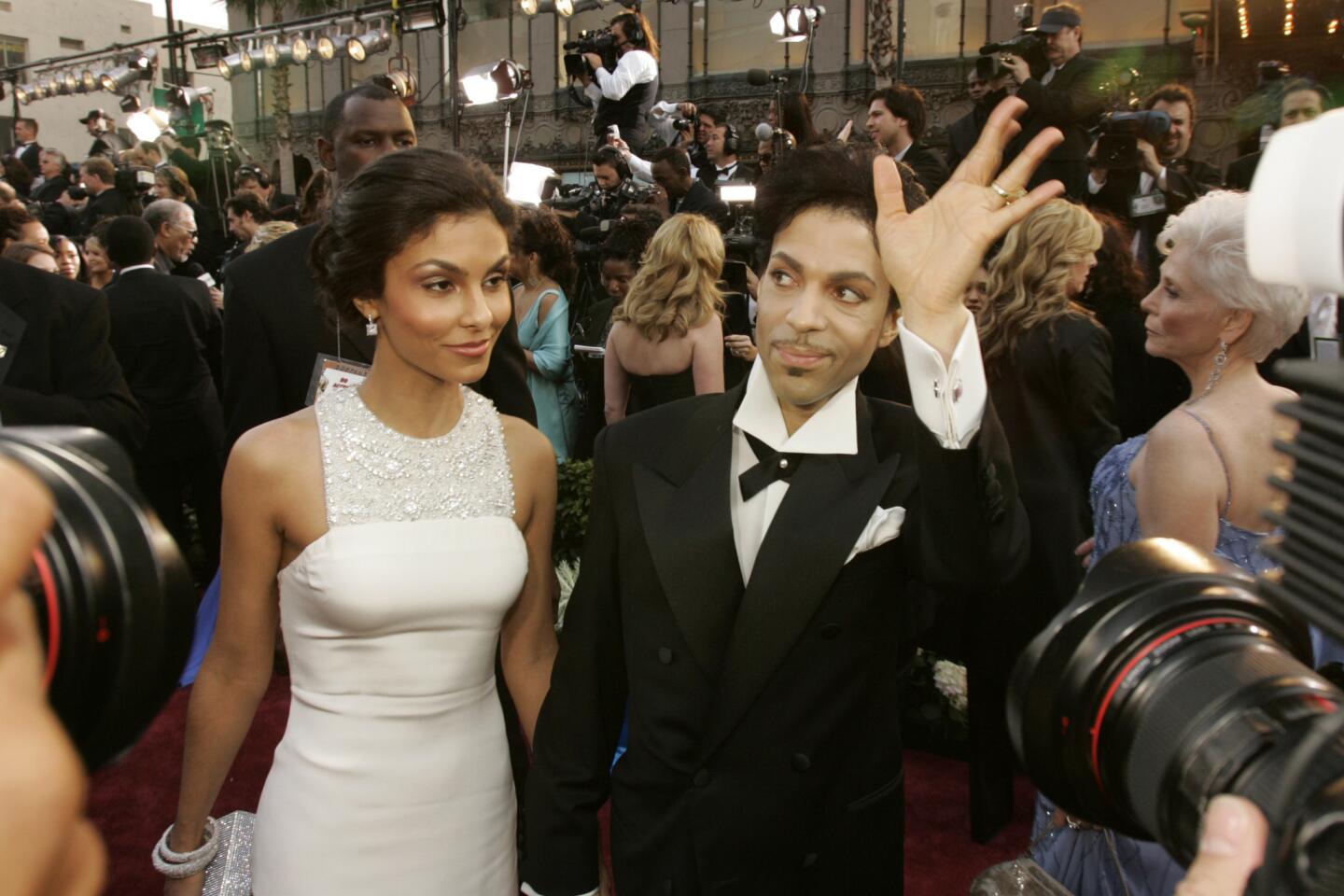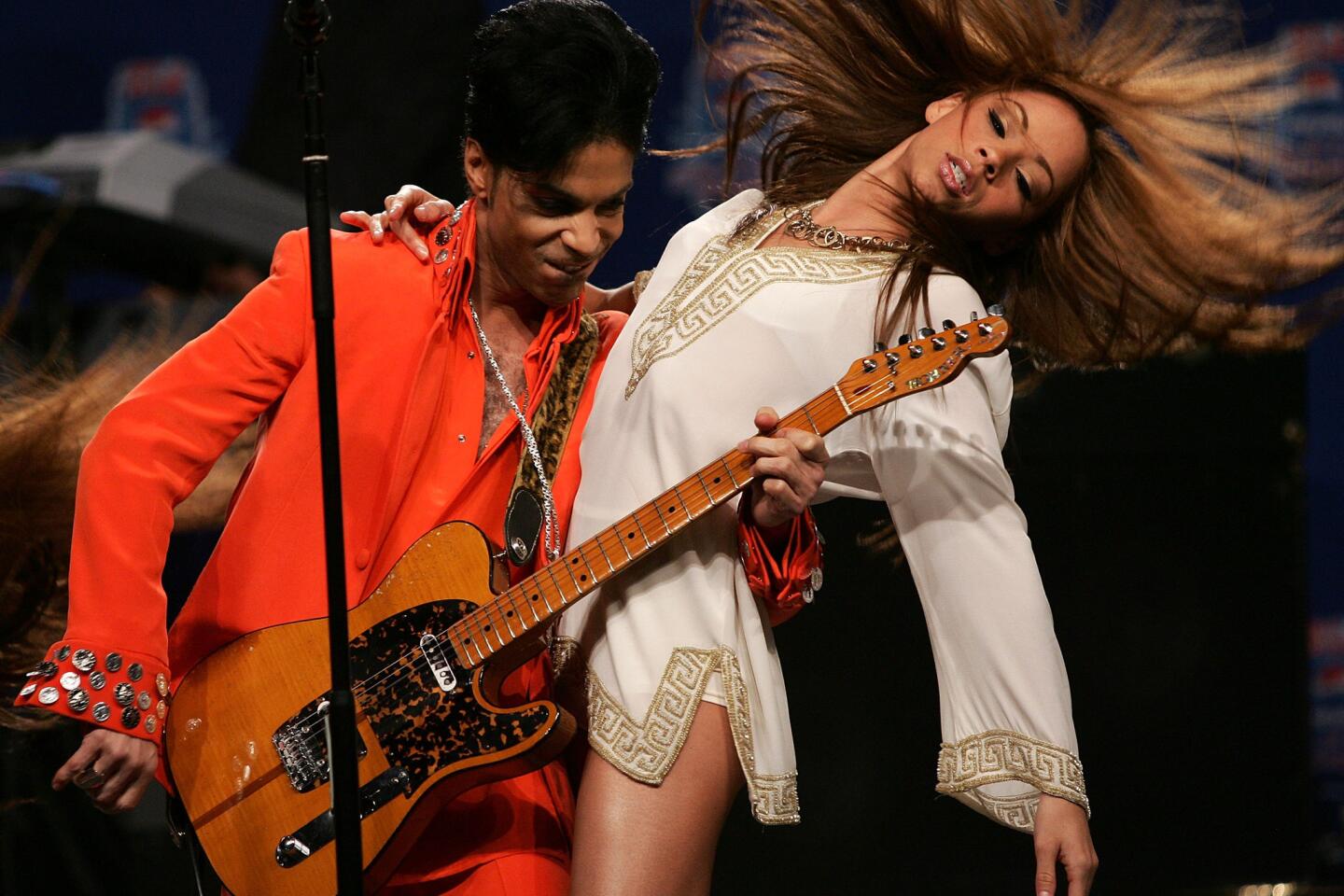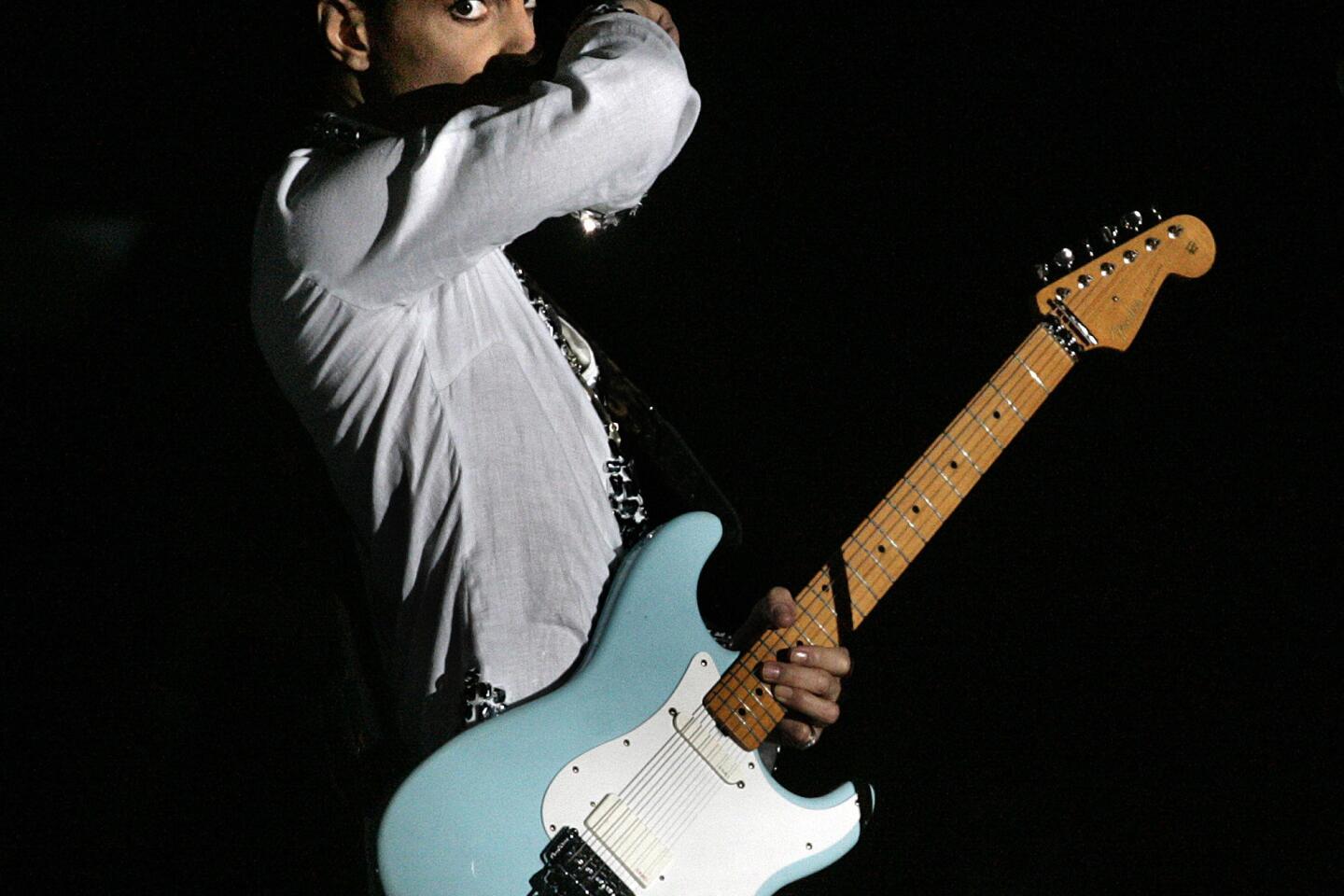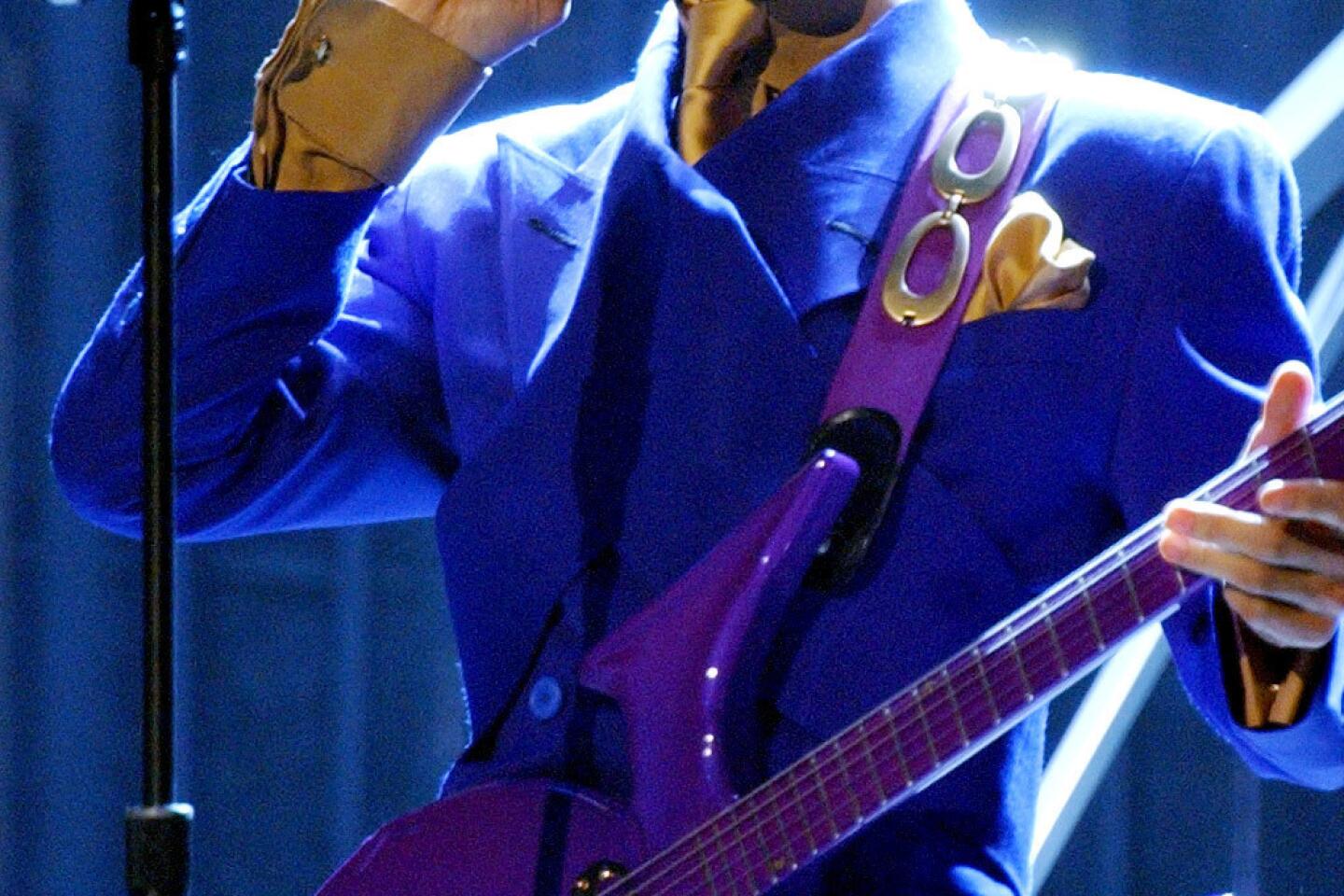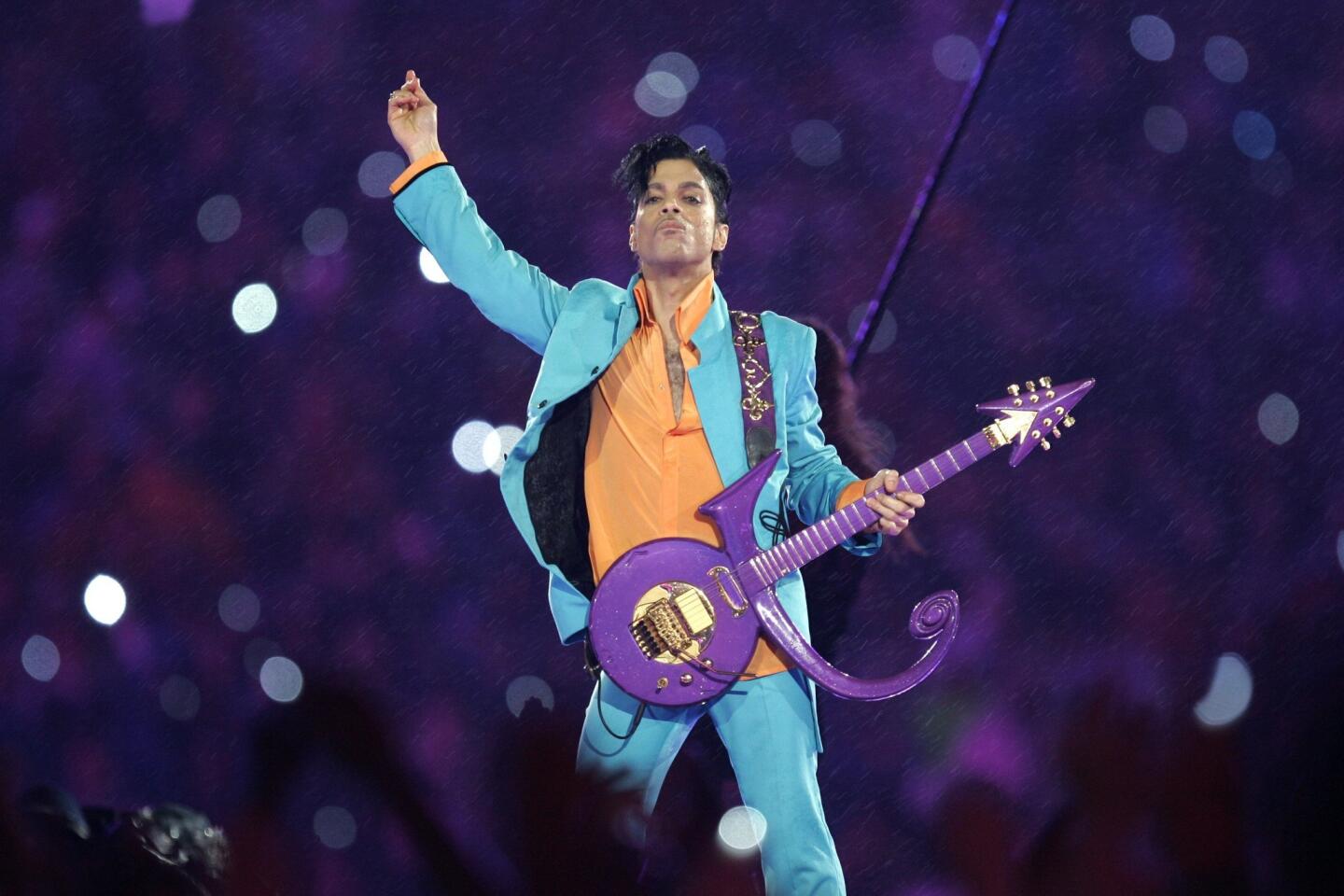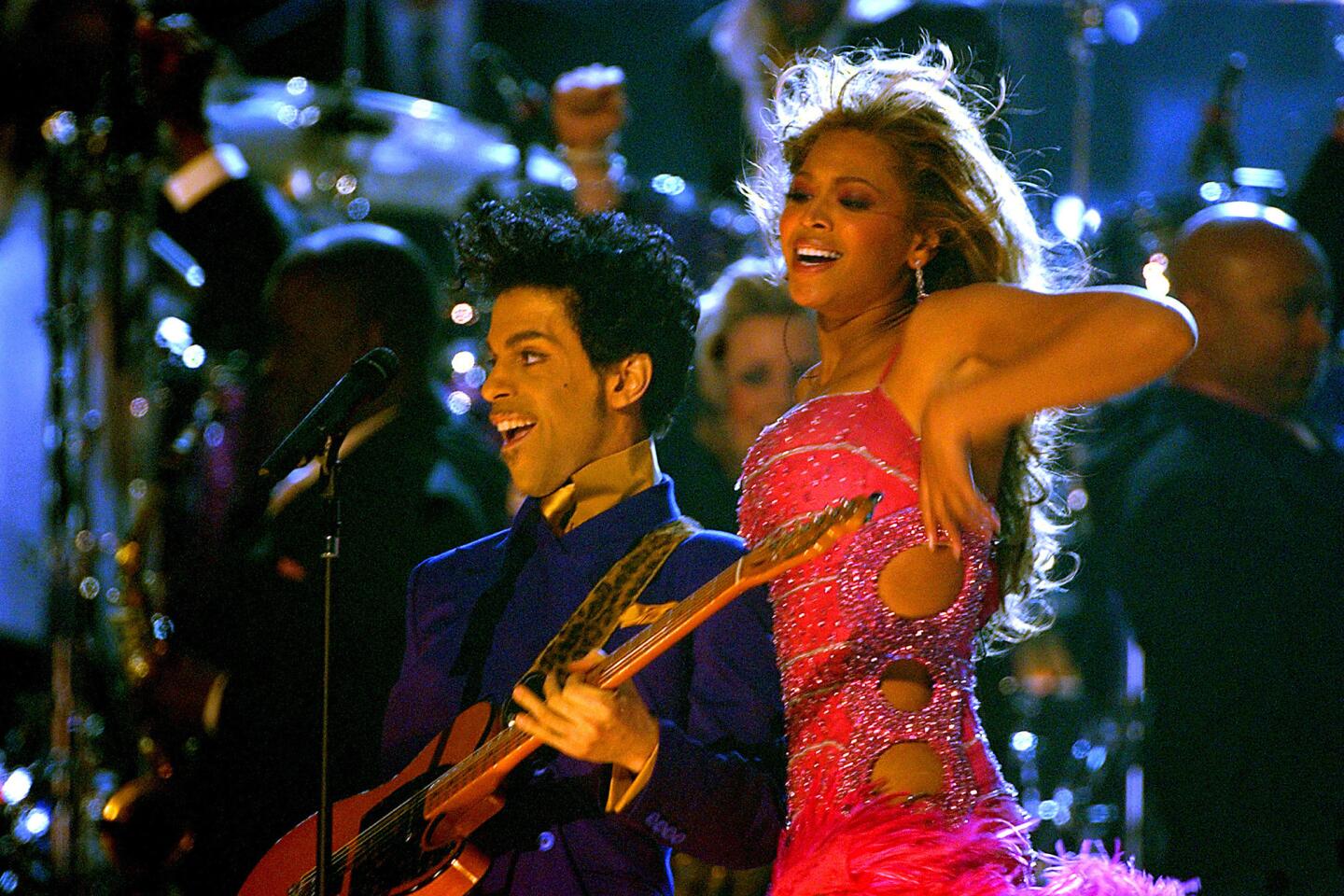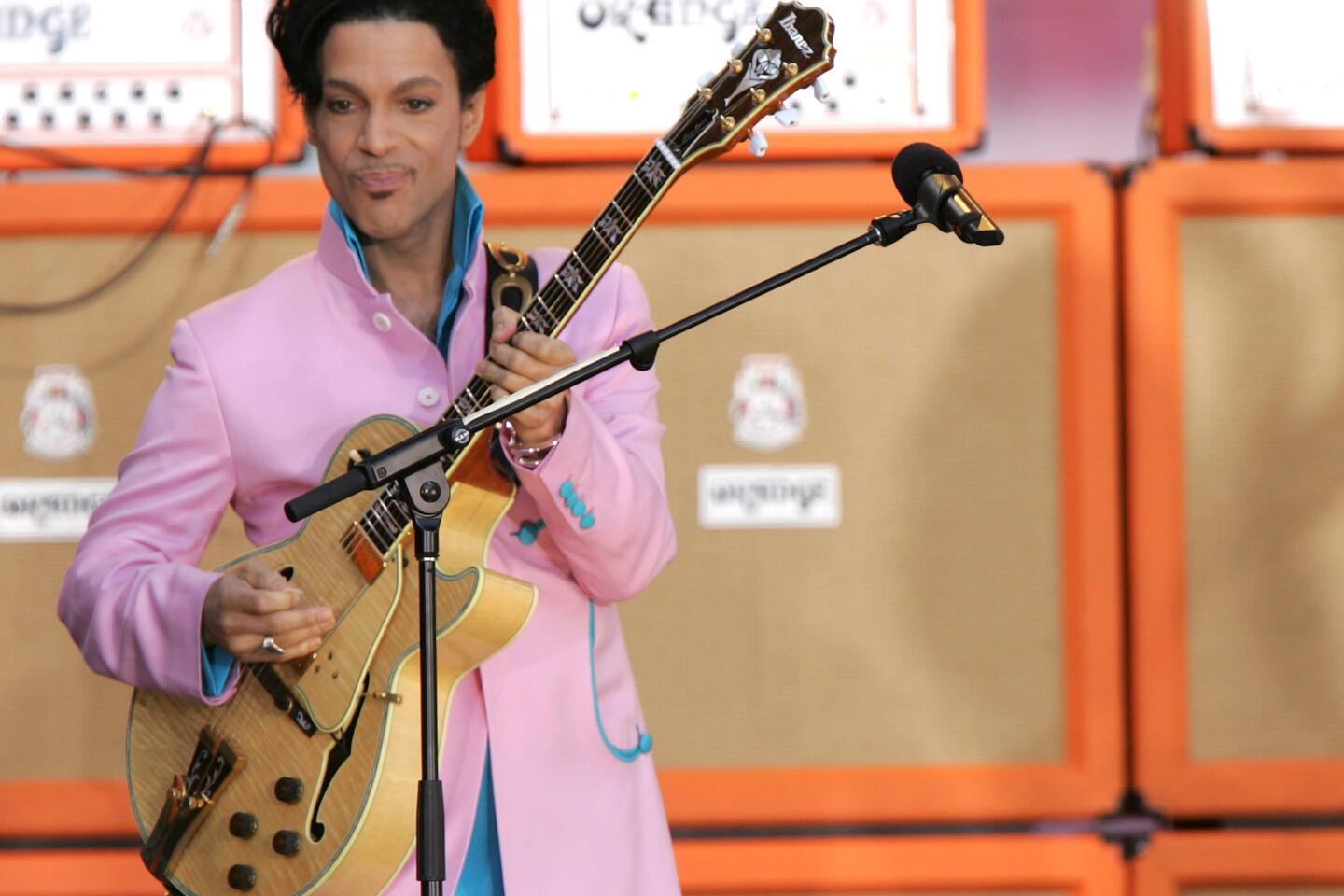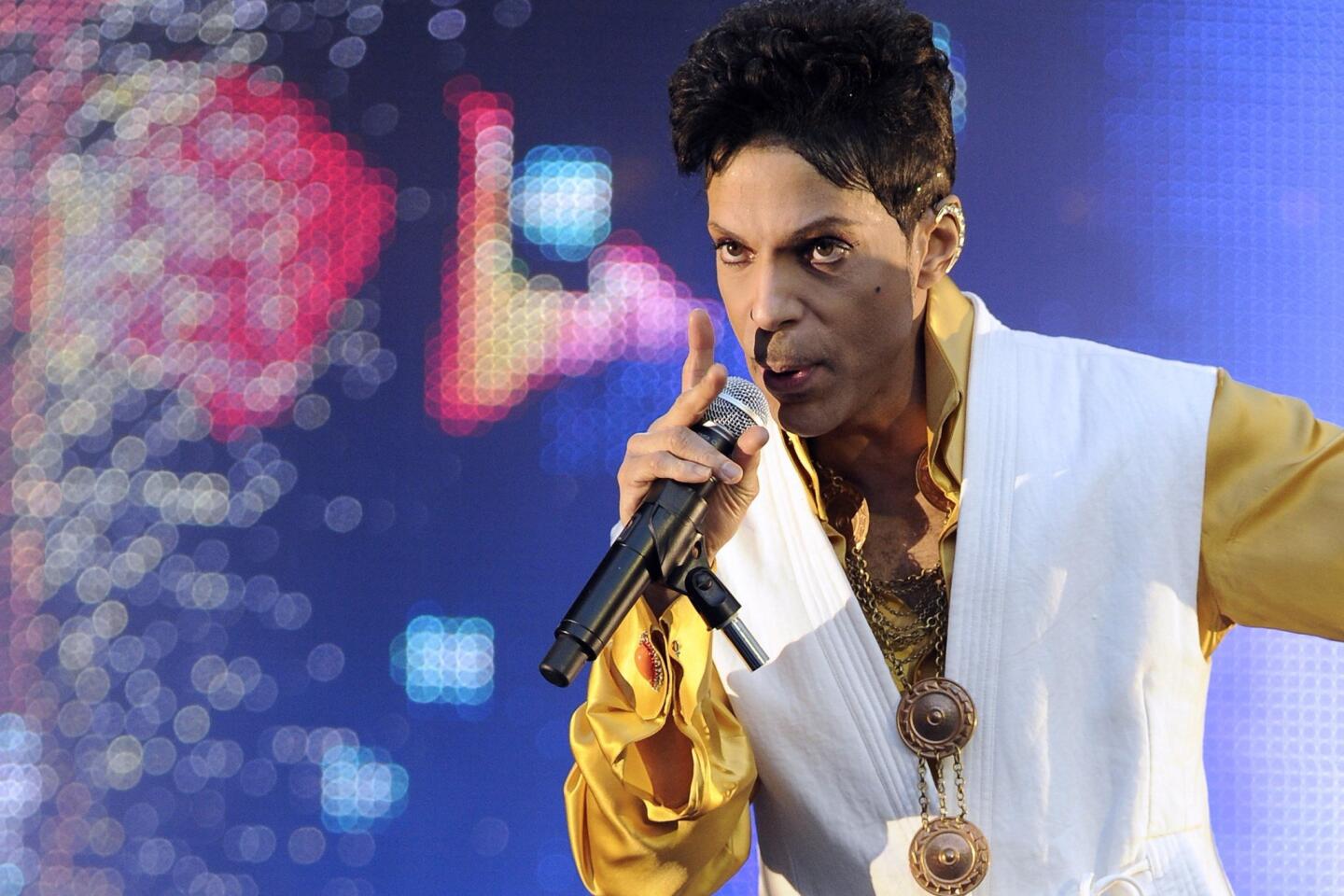Prince died from an overdose of a powerful painkiller described as ‘heroin on steroids’
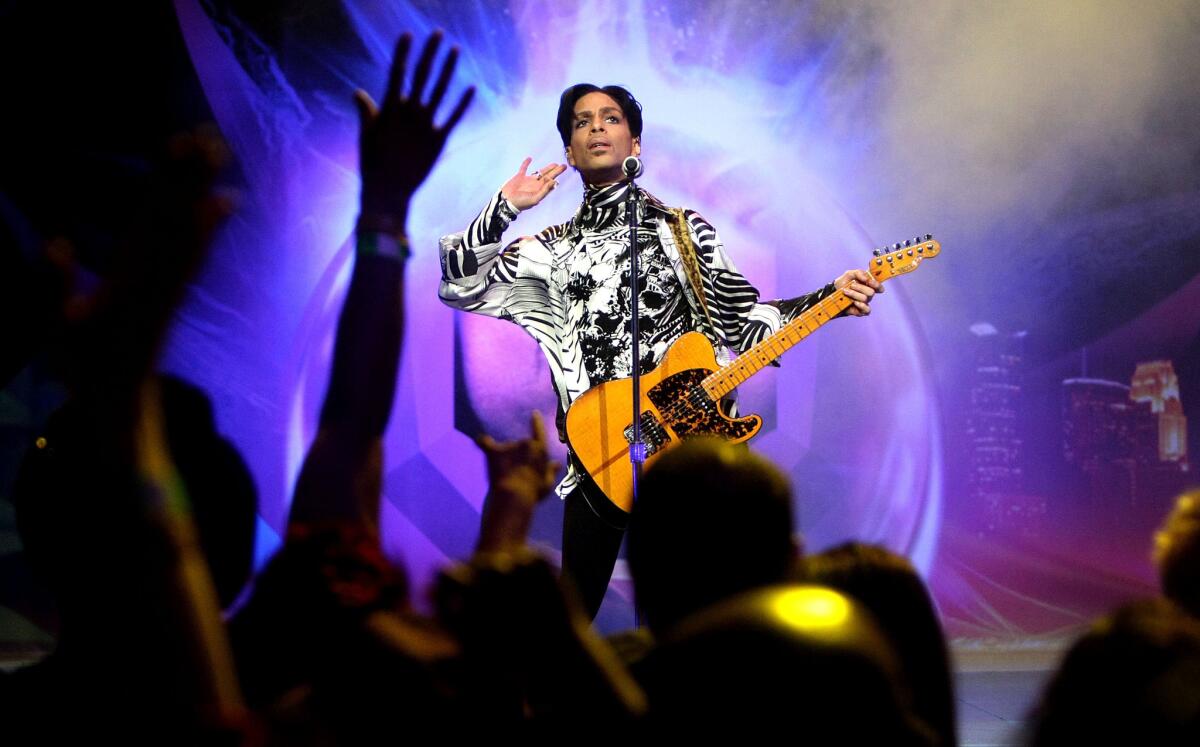
- Share via
Prince overdosed on a powerful painkiller that federal health authorities say is a public health threat. One addiction specialist calls it “heroin on steroids.”
The pop star died of a self-administered accidental overdose of fentanyl, according to the Midwest Medical Examiner’s Office in Minnesota. Fentanyl is a synthetic opioid that is between 50 to 100 times more potent than morphine, according to the Centers for Disease Control and Prevention.
How Prince obtained the prescription painkiller is not known. His April 21 death at age 57 in his Minneapolis-area compound remains under investigation by the Carver County Sheriff’s Office, which had no comment Thursday.
Fentanyl was first introduced under the name Sublimaze in the 1960s, and was initially administered via an intravenous anesthetic. Nowadays, patients can get a fentanyl dosage via tablets, patches, and injections -- or even lozenges referred to as “lollipops.”
The drug is often prescribed for patients dealing with chronic pain from late-stage cancer, and is also used as an anesthetic during heart surgery.
“Think of fentanyl as legal heroin on steroids,” said Dr. Cali Estes, a private addiction coach. “The way most people describe [the high is like] lying in a bed of roses, having sex and eating a cheeseburger at the same time.”
Doctors have to undergo special training required by the Food and Drug Administration in order to prescribe it, said Dr. Matt Torrington, addiction medicine research physician who has worked at the UCLA Integrated Substance Abuse Programs. “One reason it’s so good is that it’s incredibly powerful in small doses,” he said.
In media interviews, close associates of Prince have said the performer was constantly in pain from years of athletic performances on stage. Just before he died, efforts had been initiated to get him into an addiction rehabilitation program.
Think of fentanyl as legal heroin on steroids.
— Dr. Cali Estes, a private addiction coach
Prince’s cause of death arguably makes him the opioid abuse epidemic’s most famous victim, along with actor Philip Seymour Hoffman, who died in February 2014 after overdosing on heroin and other drugs.
“We need to see the Prince in all of us. We need to see the vulnerability. We’re all vulnerable here,” explained Dr. David Kessler, a former commissioner of the Food and Drug Administration. “It’s a wake-up call for how we view these drugs.”
Because of its heroin-like effect, fentanyl has recently become one of the most popular illicit street drugs. In a March 2015 nationwide alert, the Drug Enforcement Administration identified fentanyl as a public health threat after more than 700 fentanyl-related overdose deaths were reported between late 2013 and throughout 2014.
In 2014 alone, the National Forensic Laboratory Information System found there were 1,245 fentanyl drug seizures in Ohio alone; Minnesota was not among the top 10 states with the most seizures.
“It’s become especially popular in the last six months,” Estes said. “On the black market, fentanyl is cheaper than heroin.”
Kessler said it’s a mistake to separate people using opioids legally from those who are getting them illegally. People start, he said, because they are told the drugs are going to help, but often aren’t advised about the long-term consequences of addiction.
“The most important thing is not to look at this through a lens of ‘This is bad behavior,’” Kessler said. “We all are susceptible to these medications.”
Questions remain as to how Prince got his drugs. According to an affidavit for a search warrant obtained by the Los Angeles Times, Prince saw a Minneapolis-area doctor, Michael Todd Schulenberg, the day before he died, and Schulenberg was at Prince’s Paisley Park compound to deliver medical test results on the morning the musician was found dead.
The doctor, who specializes in family medicine, had also seen Prince earlier in the month, on April 7, and told investigators he had prescribed medication. The singer was supposed to fill the prescription at Walgreens, although it is unclear from the warrant whether he did.
Prince’s health appeared to be a concern in the days leading up to this death. Attorney William Mauzy told reporters that his client Dr. Howard Kornfeld was contacted by Prince’s representatives, who were seeking help, the day before the singer died. Kornfeld specializes in addiction treatment and runs Recovery Without Walls in Mill Valley, Calif.
Mauzy said that Kornfeld couldn’t clear his schedule and instead had sent his son Andrew Kornfeld to Paisley Park in his place with a small amount of buprenorphine, a drug used in opioid addiction treatment. Andrew Kornfeld had flown to Minneapolis in hopes of encouraging Prince to check himself into the Mill Valley rehabilitation program and that the buprenorphine he was carrying was intended to be turned over to a Minneapolis physician to be administered to the pop star. According to Mauzy, the medication was not administered and was later taken into possession by sheriff’s investigators.
We need to see the Prince in all of us. We need to see the vulnerability. We’re all vulnerable here. It’s a wake-up call for how we view these drugs.
— Dr. David Kessler, a former commissioner of the Food and Drug Administration
Dr. Kornfeld and his son declined to be interviewed.
According to authorities, Prince was last seen alive at 8 p.m. April 20, when someone dropped him off at Paisley Park. The musician was apparently left alone that night, without staff members or security.
Prince, a devout Jehovah’s Witness, was “a very private person,” said Carver County Sheriff Jim Olson. “I don’t think it would be unusual, for him to be there by himself.”
Days before Prince was found unconscious at Paisley Park Studio, he’d given his final performances in Atlanta. Despite not feeling well and reportedly fighting the flu, the performer told the concert promoter that he “would give it his all.”
“I knew after the show that he was fatigued because normally he does an after-party and he didn’t,” said Lucy Freas, who heads up Atlanta’s Rival Entertainment, which had presented Prince’s April 14 shows. “He wanted to go straight home, so he left the same night.”
The performer left the venue after those back-to-back gigs just before midnight and headed home to Minnesota, but his private plane took a detour along the way for an unscheduled landing in Moline, Ill., just after 1 a.m. Prince was unresponsive, according to an airport official.
Firefighters and paramedics spent 18 minutes attending to the singer on the tarmac, before whisking him to a hospital. “An unresponsive person is typically someone unconscious and not responding to efforts to revive them,” explained Jeff Patterson, public safety director at the Quad Cities Airport.
Prince was hospitalized for a few hours before departing in the early morning of April 15 for his home in Minnesota. Six days later, he would be found dead.
Prince’s family is planning a memorial service in August -- and is also sorting out his estate. So far, no will has surfaced for Prince. Under Minnesota law, his siblings -- including his sister, Tyka Nelson, and several half-siblings -- stand to inherit the entertainer’s assets. Prince’s two marriages ended in divorce, and his son, Boy Gregory, died in infancy in 1996.
A Minnesota judge appointed corporate trust company Bremer Trust to oversee his multimillion-dollar estate. Among the assets at stake is a catalog of music that would likely include a royalty stream for some of pop music’s most recognizable tunes, such as “Purple Rain,” “When Doves Cry” and “Kiss.”
The trailblazing performer sold more than 100 million records over his career, fusing rock, pop, funk and R&B and demonstrating an audacious, idiosyncratic sense of style and willingness to court controversy.
A Rock and Roll Hall of Fame inductee, he won seven Grammy Awards and an Academy Award for original song score for the 1984 film “Purple Rain.” He also wrote hit songs for other artists, including Sinead O’Connor’s “Nothing Compares 2 U” and The Bangles’ “Manic Monday.”
“We appreciate the public’s patience and have been comforted by your outpouring of love, support and condolences,” Prince’s family said in a statement regarding a planned public event. “We look forward to sharing with the world this celebration of, and farewell to, our Prince.”
Times staff writers Amy Kaufman, Christie D’Zurilla, Matt Pearce, Richard Winton and Peter King contributed to this report.
MORE ON PRINCE:
When Prince bended gender, he gave black men permission to be free
Appreciation: From beginning to end, Prince was always surprising us
UPDATES:
3:01 p.m.: This article was updated throughout.
1:53 p.m.: This article was updated throughout.
11:42 a.m.: This article was updated with an official cause of death.
11:15 a.m.: This article was updated with information on Prince’s autopsy and law enforcement comment.
10:25 a.m.: This article was updated with more information regarding claims of Prince’s drug use.
9:48 a.m.: This article was updated with Los Angeles Times staff reporting.
This article was originally published at 9:10 a.m.
More to Read
The biggest entertainment stories
Get our big stories about Hollywood, film, television, music, arts, culture and more right in your inbox as soon as they publish.
You may occasionally receive promotional content from the Los Angeles Times.
